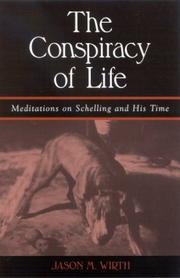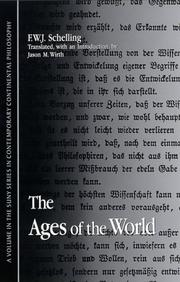| Listing 1 - 10 of 10 |
Sort by
|

ISBN: 0791486605 1417538716 9781417538713 079145794X 9780791457948 0791457931 9780791457931 9780791486603 Year: 2003 Publisher: Albany, NY State University of New York Press
Abstract | Keywords | Export | Availability | Bookmark
 Loading...
Loading...Choose an application
- Reference Manager
- EndNote
- RefWorks (Direct export to RefWorks)
The Conspiracy of Life offers a series of meditations on the philosophy of F. W. J. Schelling (1775–1854), a great—and greatly neglected—philosopher of life. Rather than construing him as a loopy mystic, or as an antiquated theologian, Jason M. Wirth attempts to locate Schelling as the belated contemporary of thinkers like Heidegger, Derrida, Bataille, Irigaray, Foucault, Deleuze, Levinas, and many others. As such, Schelling is already at the central nerve of current discussions concerning the crisis of truth; the primacy of the Good; the ecstatic nature of time; the nature of art; deep ecology; the world as an aesthetic phenomenon; comparative philosophy; the possibility of non-dialectical philosophy; radical evil; the haunting of philosophy; and the possibility of a philosophical religion.
Book
ISBN: 1461943167 1438448481 9781461943167 9781438448480 9781438448473 1438448473 9781438448466 1438448465 Year: 2013 Publisher: Albany
Abstract | Keywords | Export | Availability | Bookmark
 Loading...
Loading...Choose an application
- Reference Manager
- EndNote
- RefWorks (Direct export to RefWorks)
"Essays explore a rich intersection between phenomenology and idealism with contemporary relevance"--Provided by publisher.
Philosophy of nature. --- Nature --- Nature, Philosophy of --- Natural theology --- Philosophy --- Schelling, Friedrich Wilhelm Joseph von, --- Merleau-Ponty, Maurice, --- Schelling, Friedrich Wilhelm Joseph von --- Schelling, F. W. J. --- Schelling, Friedrich Wilhelm Joseph --- Schelling, Federico Guillermo José --- Philosophy of nature --- Merleau-Ponty, Maurice --- von Schelling, Friedrich Wilhelm Joseph --- Merleau-Ponty, Jean Jacques Maurice, --- Merlō-Ponty, Mōris, --- Ponty, Jean Jacques Maurice Merleau-, --- Ponty, Maurice Merleau-, --- מרלו־פונטי, מוריס,
Book
ISBN: 1438456808 9781438456805 9781438456799 1438456794 Year: 2015 Publisher: Albany
Abstract | Keywords | Export | Availability | Bookmark
 Loading...
Loading...Choose an application
- Reference Manager
- EndNote
- RefWorks (Direct export to RefWorks)
The last two decades have seen a renaissance and reappraisal of Schelling's remarkable body of philosophical work, moving beyond explications and historical study to begin thinking with and through Schelling, exploring and developing the fundamental issues at stake in his thought and their contemporary relevance. In this book, Jason M. Wirth seeks to engage Schelling's work concerning the philosophical problem of the relationship of time and the imagination, calling this relationship Schelling's practice of the wild. Focusing on the questions of nature, art, philosophical religion (mythology and revelation), and history, Wirth argues that at the heart of Schelling's work is a radical philosophical and religious ecology. He develops this theme not only through close readings of Schelling's texts, but also by bringing them into dialogue with thinkers as diverse as Deleuze, Nietzsche, Melville, Musil, and many others. The book also features the first appearance in English translation of Schelling's famous letter to Eschenmayer regarding the Freedom essay.
Philosophy of nature. --- Thought and thinking. --- Aesthetics. --- Beautiful, The --- Beauty --- Esthetics --- Taste (Aesthetics) --- Philosophy --- Art --- Criticism --- Literature --- Proportion --- Symmetry --- Mind --- Thinking --- Thoughts --- Educational psychology --- Psychology --- Intellect --- Logic --- Perception --- Psycholinguistics --- Self --- Nature --- Nature, Philosophy of --- Natural theology --- Schelling, Friedrich Wilhelm Joseph von, --- Schelling, Friedrich Wilhelm Joseph von --- Schelling, F. W. J. --- Schelling, Friedrich Wilhelm Joseph --- Schelling, Federico Guillermo José --- Radio broadcasting Aesthetics --- Aesthetics
Book
ISBN: 1438465440 9781438465449 9781438465432 Year: 2017 Publisher: Albany
Abstract | Keywords | Export | Availability | Bookmark
 Loading...
Loading...Choose an application
- Reference Manager
- EndNote
- RefWorks (Direct export to RefWorks)
FINALIST for the 2017 Foreword INDIES Book of the Year Award in the Philosophy categoryMeditating on the work of American poet and environmental activist Gary Snyder and thirteenth-century Japanese Zen Master Eihei Dōgen, Jason M. Wirth draws out insights for understanding our relation to the planet's ongoing ecological crisis. He discusses what Dōgen calls "the Great Earth" and what Snyder calls "the Wild" as being comprised of the play of waters and mountains, emptiness and form, and then considers how these ideas can illuminate the spiritual and ethical dimensions of place. The book culminates in a discussion of earth democracy, a place-based sense of communion where all beings are interconnected and all beings matter. This radical rethinking of what it means to inhabit the earth will inspire lovers of Snyder's poetry, Zen practitioners, environmental philosophers, and anyone concerned about the global ecological crisis.
Ecocriticism. --- Ecological literary criticism --- Environmental literary criticism --- Criticism --- Snyder, Gary, --- Dōgen, --- 道元 --- Shih-nai-te, --- Snainter, Gkary, --- ゲイリ-スナイダ-, --- Criticism and interpretation.

ISBN: 0791444171 079144418X 0585353328 9780585353326 9780791444177 9780791444184 Year: 2000 Publisher: Albany State University of New York Press
Abstract | Keywords | Export | Availability | Bookmark
 Loading...
Loading...Choose an application
- Reference Manager
- EndNote
- RefWorks (Direct export to RefWorks)
A new translation of the third and most sustained version of Schelling's magnum opus, this great heroic poem is a genealogy of time. Anticipating Heidegger, as well as contemporary debates about post-modernity and the limits of dialectical thinking, Schelling struggles with the question of time as the relationship between poetry and philosophy. Thinking in the wake of Hegel, although trying to think beyond his grasp, this extraordinary work is a poetic and philosophical address of difference, of thinking's relationship to its inscrutable ground.
God --- Ontology --- 091 SCHELLING, FRIEDRICH WILHELM JOSEPH --- Being --- Philosophy --- Metaphysics --- Necessity (Philosophy) --- Substance (Philosophy) --- 091 SCHELLING, FRIEDRICH WILHELM JOSEPH Handschriftenkunde. Handschriftencatalogi--SCHELLING, FRIEDRICH WILHELM JOSEPH --- Handschriftenkunde. Handschriftencatalogi--SCHELLING, FRIEDRICH WILHELM JOSEPH --- Misotheism --- Monotheism --- Religion --- Theism --- GOD --- RELIGION
Book
ISBN: 1438466072 9781438466071 9781438466057 9781438466064 1438466064 1438466056 Year: 2017 Publisher: Albany, NY: State university of New York,
Abstract | Keywords | Export | Availability | Bookmark
 Loading...
Loading...Choose an application
- Reference Manager
- EndNote
- RefWorks (Direct export to RefWorks)
Like Schelling before him and Deleuze and Guattari after him, Gaston Bachelard made major philosophical contributions to the advancement of science and the arts. In addition to being a mathematician and epistemologist whose influential work in the philosophy of science is still being absorbed, Bachelard was also one of the most innovative thinkers on poetic creativity and its ethical implications. His approaches to literature and the arts by way of elemental reverie awakened long-buried modes of thinking that have inspired literary critics, depth psychologists, poets, and artists alike. Bachelard’s extraordinary body of work, unduly neglected by the English-language reception of continental philosophy in recent decades, exhibits a capacity to speak to the full complexity and wider reaches of human thinking. The essays in this volume analyze Bachelard as a phenomenological thinker and situate his thought within the Western tradition. Considering his work alongside that of Schelling, Husserl, Bergson, Buber, Heidegger, Merleau-Ponty, Gadamer, Deleuze, and Nancy, this collection highlights some of Bachelard’s most provocative proposals on questions of ontology, hermeneutics, ethics, environmental politics, spirituality, and the possibilities they offer for productive transformations of self and world.
Bachelard, Gaston, --- Bachelard, Gaston --- Philosophy --- Phenomenology --- Bachelard, Gaston, - 1884-1962 --- Phenomenology.
Book
ISBN: 1282588133 9786612588136 1443818259 9781443817585 1443817589 9781443818254 Year: 2010 Publisher: Newcastle upon Tyne Cambridge Scholars
Abstract | Keywords | Export | Availability | Bookmark
 Loading...
Loading...Choose an application
- Reference Manager
- EndNote
- RefWorks (Direct export to RefWorks)
The Continental tradition has always placed great emphasis on the logos. The Gift of Logos: Essays in Continental Philosophy celebrates and situates this emphasis in the genre of the gift and its giving. The process of receiving, or giving, of the gift overcomes the existential alienation and separation that is so present in the human condition. To ritualize giving and its gifting is to provide a syntax of solidarity that bespeaks our desire for cohesion and need for identities beyond our own...
Book
ISBN: 0810131617 9780810131613 9780810131606 0810131609 9780810131590 0810131595 Year: 2015 Publisher: Evanston, Illinois
Abstract | Keywords | Export | Availability | Bookmark
 Loading...
Loading...Choose an application
- Reference Manager
- EndNote
- RefWorks (Direct export to RefWorks)
Art --- Aesthetics. --- Philosophy. --- Sallis, John,
Book
ISBN: 1283101726 9786613101723 0253004977 9780253004970 9781283101721 9780253355447 0253355443 9780253222541 0253222540 6613101729 Year: 2011 Publisher: Bloomington, Ind. Indiana University Press
Abstract | Keywords | Export | Availability | Bookmark
 Loading...
Loading...Choose an application
- Reference Manager
- EndNote
- RefWorks (Direct export to RefWorks)
Recognizing the importance of the Kyoto School and its influence on philosophy, politics, religion, and Asian studies, Japanese and Continental Philosophy initiates a conversation between Japanese and Western philosophers. The essays in this cross-cultural volume put Kyoto School thinkers in conversation with German Idealism, Nietzsche, phenomenology, and other figures and schools of the continental tradition such as Levinas and Irigaray. Set in the context of global philosophy, this volume offers critical, innovative, and productive dialogue between some of the most influential philosophical figures from East and West.
Philosophy, Japanese. --- Philosophy, Comparative. --- Continental philosophy. --- Nishida, Kitarō, --- Nishitani, Keiji, --- Tanabe, Hajime,
Book

ISBN: 8878856029 8878856010 8878855960 8878856002 Year: 2018 Publisher: Torino : Rosenberg & Sellier,
Abstract | Keywords | Export | Availability | Bookmark
 Loading...
Loading...Choose an application
- Reference Manager
- EndNote
- RefWorks (Direct export to RefWorks)
La natura della libertà è in fondo la libertà della natura stessa, ossia la sua insopprimibile soggettività. Attorno a questa inestricabile relazione, illuminata e indagata a fondo dalla filosofia di Schelling, alcuni fra i più autorevoli interpreti contemporanei s’interrogano sull’impossibile sistema del sapere a cui il filosofo tedesco lavorò per tutta la vita, individuando proprio nella libertà quel fondamento necessario eppure apparentemente inattuabile. Il risultato è un quadro composito e aggiornato degli esiti in ambito teoretico, etico ed estetico della filosofia di Schelling, che oggi vive una rinascita di livello internazionale.
Philosophy --- Schelling --- libertà --- natura --- filosofia --- liberté --- nature --- philosophie --- freedom --- philosophy
| Listing 1 - 10 of 10 |
Sort by
|

 Search
Search Feedback
Feedback About UniCat
About UniCat  Help
Help News
News